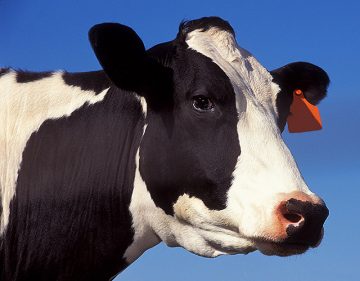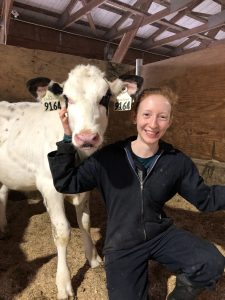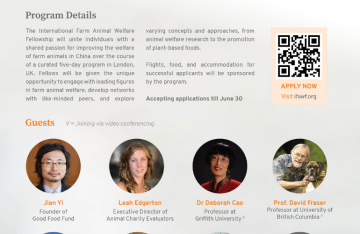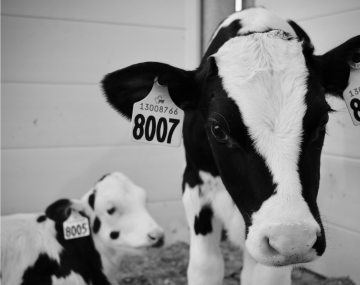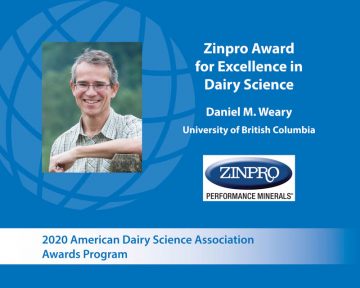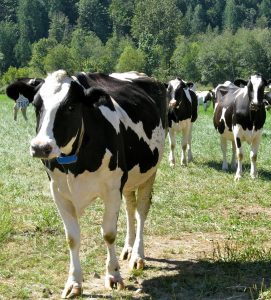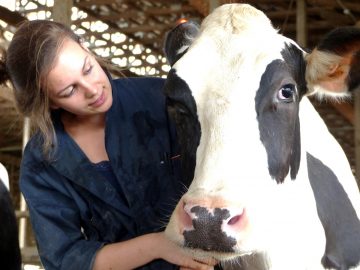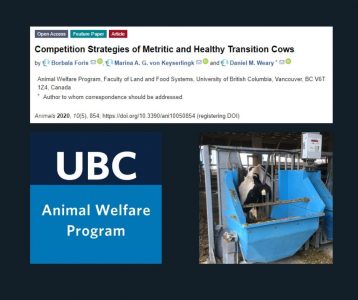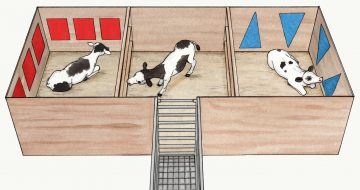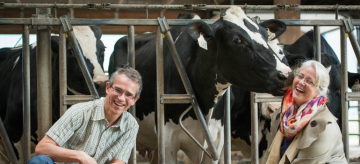Dairy Cattle
Behavioral changes associated with fever in transition dairy cows
New research from the Animal Welfare program looks at behavioural changes associated with fever in transition dairy cows. Dairy cows are often diagnosed with fever without showing clinical symptoms of disease. The aim of this study was to investigate changes in feeding, social, and lying behaviors of cows with fever but without clinical disease, as […]
Hannah Spitzer awarded Canadian Society of Animal Science Award for Undergraduate Achievement
Congratulations to Hannah Spitzer, an undergraduate student in LFS who recently won the 2020 Canadian Society of Animal Science Award for Undergraduate Achievement. Hannah is currently an NSERC Undergraduate scholar, doing research out at UBC’s Dairy Centre in Agassiz under the supervision of Dr. Nina von Keyserlingk. Learn more about Hannah as one of our class of […]
Applications for the inaugural International Farm Animal Welfare Fellowship closing June 30
The IFAWF is aimed at those in the early stages of their career seeking a career in farmed animal welfare in mainland China. It will provide the unique opportunity to engage with field-leading experts, explore animal welfare issues and strategies in a Chinese context, and learn how academic concepts can be applied to improve animal […]
Personality traits of dairy calves predict social proximity and response to emotional challenge
The AWP recently published an open access article, published in Scientific Reports, which has been selected part of the Editor’s choice Collection on Animal cognition and personality. Read the article: https://www.nature.com/collections/gbggjfgbbh/
Dan Weary awarded Zinpro Award for Excellence in Dairy Science
The Animal Welfare Program’s Dan Weary has been awarded the Zinpro Award for Excellence in Dairy Science from the American Dairy Science Association. Dan was selected for his scientific contributions to dairy cattle science, including research on methods of assessing and relieving pain and distress in cattle, developing alternative methods of housing and cattle management, methods […]
The welfare of cull dairy cows in British Columbia
Two studies have recently been published on the welfare of cull dairy cows from the Animal Welfare Program. In one, cull dairy cows were monitored from 20 farms in British Columbia. We found that most cows took three days or more to reach the slaughter plants. The study investigates the impact on duration of transport […]
The Influence of Different Types of Outdoor Access on Dairy Cattle Behavior
New review paper from the Animal Welfare Program in Frontiers in Veterinary Science reviews the existing literature on how access to outdoor areas can influence dairy cattle behavior. Read the article: https://www.frontiersin.org/articles/10.3389/fvets.2020.00257/full
Social competition strategies of transition dairy cows
New research paper from the UBC Animal Welfare Program investigates the social competition strategies of transition dairy cows.The association between strategy change and metritis indicates that automatic behavioral measurements may help in early illness detection. Read article: https://www.mdpi.com/2076-2615/10/5/854/htm
Investigating empathy in dairy calves
Recent research conducted at the University of British Columbia’s Animal Welfare Program has investigated empathy in dairy calves. In this study, published in PLoS ONE, calves witnessed two ‘demonstrators’ pen mates recover from different procedures: one from a common painful surgery (disbudding, which is the prevention of horn growth by cauterisation) and the other from […]
Animal welfare project co-led by Dan Weary awarded $1.4M by Genome Canada’s Genomics in Society Interdisciplinary Research Team
Congratulations to Animal Welfare Program Professor Dan Weary, academic co-lead on a $1.4M project funded by Genome Canada’s Genomics in Society Interdisciplinary Research Team program. He’ll partner with Michael von Massow (University of Guelph) to better understand barriers and opportunities for commercializing gene-edited beef and dairy products. News release
